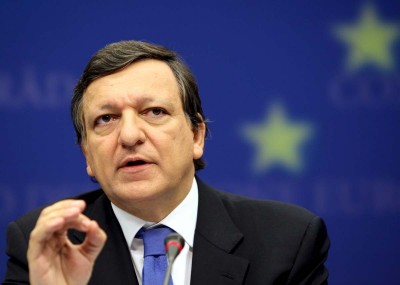Former President of EU Commission Juan Manuel Barroso: Conflict of Interest, “Deep Ties” to Goldman Sachs

Jose Manuel Barroso had closer contact with Goldman Sachs during his tenure as European Commission chief than he has previously admitted, according to Portuguese media.
Correspondence obtained by Portuguese daily Publico under a freedom of information request suggests that Barroso, who took a job with the US bank earlier this year, held unregistered meetings with Goldman’s top people.
In one email dated 30 September 2013, Goldman boss Lloyd Blankfein thanked Barroso for their “productive discussions” and said the bank’s senior partners were delighted about their “extremely fruitful meetings”.
Publico reported that Goldman executives were happy to suggest “on a confidential basis” changes to EU policies, which Barroso’s cabinet read “with great interest”.
The newspaper also found that one of Barroso’s advisers was “unfavourable” to putting down in the commission’s records meetings between his boss and the bank.
Filing meetings between EU top officials and interest representatives was not mandatory at the time, so Barroso’s meetings were registered only when his cabinet deemed it suitable.
Barroso told Publico in a written statement he kept in touch with major banks as part of his job as president of the EU executive in a time of financial crisis.
“This was not only to understand the market sentiment, but also to pass clear messages on the position of the Commission and the European Union,” he wrote.
The European Commission has so far not commented on these revelations.
The Portuguese politician also complained of discrimination on Friday (23 September), during his first meeting with journalists since the announcement of his new job.
Revolving doors
Nine of 26 commissioners that left office in 2014 have since taken up positions in organisations with links to big business, according to Corporate Observatory Europe, a transparency campaign group in Brussels.
In one example, former antitrust and digital agenda boss Neelie Kroes took up a job in May with Uber, a tech firm that she vocally supported while in office.
Barroso’s successor Jean-Claude Juncker claimed over the summer that Barroso had followed the rules, but that there was a political problem in his choice of employer.
Goldman Sachs traded complex financial instruments around subprime mortgages, helping to cause the 2007 global financial crisis. The bank also helped Greece to conceal its debt figures, complicating the subsequent EU sovereign debt crisis.
The bank is known for cultivating close ties with politicians, which earned it the nickname ‘Government Sachs’.
Former commissioner Mario Monti took up a job at Goldman after leaving the commission, and was Goldman’s international adviser when he was appointed as Italy’s prime minister in 2011.
The current president of the European Central Bank (ECB), Mario Draghi, also worked for the bank prior to becoming the governor of the Bank of Italy and then taking up the ECB post.
The EU Commission has defended its code of conduct as “the world’s strictest”.
At a time of high public mistrust in the EU institutions, it has taken some steps to tighten up its rules – including making it mandatory to register all meetings between officials and interest representatives.

